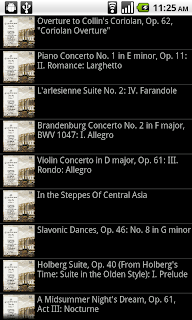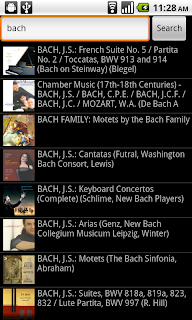
Sometimes I think the big names in classical music get a bum rap just for being well known. Maybe it's a form of classical music hipsterism. So on this, his 240th birthday, it's time to show some respect to The Most Classic of Classical Composers. He's the one everyone knows, and for good reason. It's 1770. Enter Ludwig van Beethoven.
Born in Bonn in 1770, the eldest son of a singer in the Kapelle of the Archbishop-Elector of Cologne and grandson of the Archbishop's Kapellmeister, Beethoven moved in 1792 to Vienna, where he had some lessons from Haydn and others, quickly establishing himself as a remarkable keyboard-player and original composer. By 1815 increasing deafness made public performance impossible and accentuated existing eccentricities of character, patiently tolerated by a series of rich patrons and his royal pupil the Archduke Rudolph. Beethoven did much to enlarge the possibilities of music and widen the horizons of later generations of composers. To his contemporaries he was sometimes a controversial figure, making heavy demands on listeners both by the length and by the complexity of his writing, as he explored new fields of music.
Stage Works
Beethoven wrote only one opera, eventually called Fidelio after the name assumed by the heroine Leonora, who disguises herself as a boy and takes employment at the prison in which her husband has been unjustly incarcerated. This escape opera, for which there was precedent in contemporary France, ends with the defeat of the evil prison governor and the rescue of Florestan, testimony to the love and constancy of his wife Leonora. Beethoven contemplated other operas, but eventually only wrote the one, first staged in 1805 and mounted again in a revised performance in 1814, under more favourable circumstances. The ballet The Creatures of Prometheus was staged in Vienna in 1801, and he wrote incidental music for various other dramatic productions, including Goethe's Egmont, von Kotzebue's curious The Ruins of Athens, and the same writer's King Stephen.
Choral and Vocal Music
Beethoven's most impressive choral work is the Missa Solennis, written for the enthronement of his pupil Archduke Rudolph as Archbishop of Olmutz, but finished too late for that occasion. An earlier work, the oratorio The Mount of Olives, is less well known. In common with other composers, he wrote a number of songs. Of these the best known are probably the settings of Goethe, which did little to impress the venerable poet and writer, who ignored their existence, and the cycle of six songs known as An die ferne Geliebte (To the Distant Beloved). The song Adelaide is challenging but not infrequently heard.
Orchestral Music
Beethoven completed nine symphonies, works that influenced the whole future of music by the expansion of the traditional classical form. The best known are the Third, "Eroica", originally intended to celebrate the initially republican achievements of Napoleon, the Fifth, the Sixth, "Pastoral", and the Ninth, "Choral". The less satisfactory Battle Symphony celebrates the earlier military victories of the Duke of Wellington. For the theatre and various other occasions Beethoven wrote a number of Overtures, including four for his only opera, Fidelio, one under that name and the others under the name of the heroine, Leonora. Other Overtures include Egmont, Coriolan, Prometheus, The Consecration of the House and The Ruins of Athens. Beethoven completed one violin concerto and five piano concertos, as well as a triple concerto for violin, cello and piano, and a curious Choral Fantasia,for solo piano, chorus and orchestra. The piano concertos were for the composer's own use in concert performance. The Fifth, the so-called "Emperor" Concerto, is possibly the most impressive. The single Violin Concerto is part of the standard repertoire, with two Romances, possible slow movements for an unwritten violin concerto.
Chamber Music
Beethoven wrote ten sonatas for violin and piano, of which the "Spring" and the "Kreutzer" are particular favourites with audiences. He extended very considerably the possibilities of the string quartet, even with his first, Opus 18 set of quartets, but it is possibly the named quartets, the group of three dedicated to Prince Razumovsky and known, therefore, as the Razumovsky Quartets, Opus 59, that are best known. The later string quartets offer great challenges to both players and audience, and include the remarkable Grosse Fuge (Great Fugue) a gigantic work, discarded as the final movement of the String Quartet, Opus 130, and published separately. Other chamber music includes a number of Trios for violin, cello and piano, with the "Archduke" Trio pre-eminent and the "Ghost" Trio a close runner-up, for very different reasons. The Cello Sonatas and sets of Variations for cello and piano, including one set based on Handel's See here the conquering hero comes and others on operatic themes from Mozart, are a valuable part of any cellist's repertoire. Chamber music with wind instruments and piano include a Quintet, Op. 16, for piano, oboe, clarinet, horn and bassoon.
Piano Music
Beethoven's 32 numbered piano sonatas make full use of the developing form of piano, with its wider range and possibilities of dynamic contrast. There are also interesting sets of variations, including a set based on God save the King and another on Rule, Britannia, variations on a theme from the Eroica Symphony and a major work based on a theme by the publisher Diabelli. The best known of the sonatas are those that have earned themselves affectionate nicknames, the Pathétique, Op. 13, Moonlight, Op. 27/2, Waldstein, Op. 53, Appassionata, Op. 57, Les Adieux, Op. 81a, and the Hammerklavier, Op. 106. Less substantial piano pieces include three sets of Bagatelles, and the all too well known FŸr Elise, with the Rondo a capriccio, known in English as Rage over a Lost Penny.
Dance Music
Famous composers like Haydn and Mozart were also employed in the practical business of providing dance music for court and social occasions. Beethoven wrote a number of sets of Minuets, German Dances and Contredanses, ending with the so-called Mödlinger Dances, written for performers at a neighbouring inn during a summer holiday outside Vienna.
So celebrate his incredible contributions--from his commanding and revolutionary use of harmony to his single-handed establishment of what would become the romantic symphonic form--by doing some exploratory listening. Personally, I'm going to spend some time with his less-known vocal works.
Pro musica,
Mo
nmlhelp@naxosusa.com









